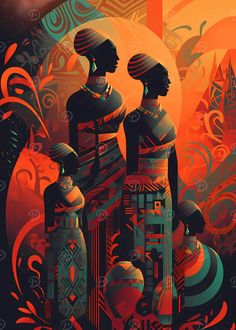Your cart is currently empty!

The Desecration of African Cultures and Traditions by European Imperialists During Colonial Rule: The Role of Ignorance
By Nathan Kiwere
The colonial period in Africa was marked by a profound disruption of indigenous cultures, traditions, and social structures. Driven by imperialist ambitions, European powers saw it as their duty to “civilize” Africa, attempting to replace indigenous beliefs and ways of life with Western ideologies and systems. This “civilizing mission” reflected a deep ignorance and misunderstanding of the complex societies and rich cultural heritage that flourished in Africa long before colonial contact. European imperialists, guided by assumptions of superiority and ethnocentric views, desecrated African culture in ways that have left enduring scars on the continent. This essay explores how the ignorance of African culture among European colonizers fueled the systematic dismantling of African traditions and belief systems, often with devastating consequences.
One of the most striking examples of cultural desecration driven by European ignorance was the disregard for African indigenous knowledge systems. Many African societies had intricate indigenous knowledge systems that faciltated their very wellbeing. Europeans, however, dismissed these practices as pagan or primitive. Missionaries, backed by colonial administrations, undertook vigorous campaigns to replace indigenous knowledge sysrems with Western religion.
African governance systems were often complex and highly organized, characterized by checks and balances that included councils of elders, traditional leaders, and sometimes democratic mechanisms for selecting leaders. Europeans, unfamiliar with and dismissive of these systems, deemed them backward and inadequate for managing what they saw as “modern” society. European ignorance of African governance systems led to the imposition of foreign political structures that disregarded the social organization and customs already in place.
In Rwanda, for example, the Belgians restructured the local governance system, pitting the Tutsi and Hutu communities against each other in ways that did not align with their historical interactions. Belgian administrators enforced a system based on racial superiority, assuming the Tutsis were “closer to Europeans” in their physical characteristics and thus more fit to lead. This oversimplification and interference with Rwanda’s social fabric laid the groundwork for decades of ethnic tension and ultimately the horrific genocide of 1994. The Belgians’ failure to understand or respect Rwandan social and governance structures had catastrophic consequences that extended well beyond the colonial period.
Colonial powers also sought to replace African languages with European languages, erasing indigenous knowledge encoded in local dialects. Language is not merely a means of communication but a vessel for culture, history, and identity. By imposing their languages, Europeans disrupted the transmission of indigenous knowledge and oral traditions. This was often rationalized as a means to “educate” Africans, yet it disregarded the rich knowledge systems already present within African societies.
For example, in Kenya, the British discouraged the use of Swahili and indigenous languages in schools, enforcing English as the primary language of instruction. This policy not only alienated many Kenyans from their heritage but also created a cultural divide that hindered the intergenerational transmission of knowledge. Kenyan children were forced to adopt a language and educational system that taught them to view their culture as inferior. This linguistic imposition had lasting effects on Kenyan identity and the preservation of indigenous knowledge, weakening the bond between younger generations and their cultural roots.
African art has always been deeply interwoven with societal functions, ranging from rituals to historical record-keeping. However, European colonizers and anthropologists, often lacking any understanding of these functions, pillaged African artifacts and either sold them or displayed them in museums as exotic artifacts devoid of cultural context. This was not only theft of material items but also an erasure of cultural heritage.
A poignant example is the looting of the Benin Bronzes in 1897 by British forces. These artifacts, created by the Edo people of the Kingdom of Benin (modern-day Nigeria), were rich with historical, religious, and cultural significance. For the British, these bronzes were merely treasures to be taken back to England and displayed. They ignored their deep meaning, reducing them to “primitive art” and stripping them of their cultural context. This form of cultural desecration deprived the Edo people of an essential aspect of their heritage and imposed a foreign narrative on their own historical symbols.
African societies have traditionally held strong kinship ties, communalism, and social structures that revolve around family and community. Europeans, however, perceived these structures as uncivilized and often attempted to break them apart to impose Western individualistic values. This ignorance of African social norms led to policies that undermined African family structures, such as separating family members through forced labor or re-settling entire communities.
In Southern Africa, under apartheid in South Africa, the British and subsequently the Dutch disrupted African communities through policies like forced removals and homelands. Black families were systematically broken up, with men sent to work in mines and women and children left to subsist in poverty-stricken homelands. This uprooted traditional African social structures, leaving deep psychological scars and contributing to social issues that persist to this day.
The desecration of African indigenous knowledge, governance systems, languages, art, and social structures stemmed largely from this ignorance and misunderstanding, leaving a legacy of disruption that continues to affect the continent today. Recognizing the role of ignorance in colonial atrocities is essential in appreciating the richness of African culture and in fostering a deeper understanding of the resilience of African societies.

Leave a Reply